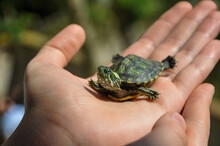Pet turtles are a source of germs, especially Salmonella
U.S. Food and Drug Administration (FDA)
The little glassy-eyed creatures may look cute and harmless, but turtles can make people sick. The most common germ spread from turtles is called Salmonella. People can get Salmonella by coming in contact with turtles or their habitats.
Small turtles are especially a problem because kids are more likely to put these animals in their mouths, kiss them, and not wash their hands after handling them. Because of this health risk, since 1975, the U.S. Food and Drug Administration (FDA) has banned the sale of small turtles with a shell less than 4 inches long.
How do people get Salmonella infections from turtles?
Turtles might have Salmonella germs on their bodies even when they appear healthy and clean. When people touch turtles, the germs can get on hands or clothing. This is true for any turtle — no matter if they are in a home, at a petting zoo or school, or in the wild.
The germs can also be in the water turtles live or swim in and can get on cages, aquariums, terrariums, and other containers that house turtles. This is why it’s important to clean turtle habitats outside of the home, when possible.
Surfaces such as countertops, tabletops, bare floors, and carpeting can also become contaminated with Salmonella if the turtle is placed on them. Don’t let turtles roam freely throughout the house or in areas where food or drink is prepared, served, or stored, such as kitchens, pantries, or outdoor patios.
Who is at risk for getting sick?
Anyone can get Salmonella infection, but the risk is highest in:
• Infants.
• Children younger than 5 years old.
• Adults 65 or older.
• Anyone with lowered natural resistance to infection due to pregnancy, cancer, HIV/AIDS, diabetes, and other diseases.
What are the symptoms of a Salmonella infection?
Salmonella can make people sick with:
• Diarrhea (which may be bloody).
• Vomiting.
• Fever.
• Abdominal cramps.
Sometimes, people can become so sick from a Salmonella infection that they have to go to the hospital. Infants, young children, people 65 or older, and those with weakened immune systems are more likely than others to develop severe illness. When severe infection occurs, Salmonella may spread from the intestines to the bloodstream and then to other body sites and can cause death unless the person is treated promptly with antibiotics.
Occasionally, an infection can get so bad that it leads to death. An example is the 2007 death of a 4-week-old baby in Florida linked to Salmonella from a small turtle. The DNA “fingerprint” of the Salmonella bacteria from the turtle matched that from the infant.
How do I reduce the risk of Salmonella infection from reptiles and amphibians?
DO:
• Wash your hands thoroughly with soap and warm water immediately after touching a reptile or amphibian, or anything in the area where they live and roam. Use hand sanitizer if soap and water are not readily available.
• Adults should always supervise hand washing for young children.
• Handwashing is also especially important for older adults, or people with weakened immune systems.
• Keep reptiles and amphibians out of homes with children younger than 5 years old or people with weakened immune systems.
• Habitats and their contents should be carefully cleaned outside of the home.
DON’T:
• Don’t let children younger than 5 years of age, older adults, or people with weak immune systems handle or touch amphibians or reptiles, or anything in the area where they live and roam, including water from containers or aquariums.
• Don’t keep reptiles and amphibians in child care centers, nursery schools, or other facilities with children younger than 5 years old and other high-risk individuals.
• Don’t let reptiles or amphibians roam freely throughout the house or in areas where food or drink is prepared, served, or stored, such as kitchens, pantries, or outdoor patios.
• Don’t bathe animals or clean their habitats in your kitchen sink, bathroom sink, or bathtub. To prevent cross-contamination, animals should be bathed in a small plastic tub or bin that is dedicated for animal use only.
• Don’t buy turtles less than 4 inches in length.
